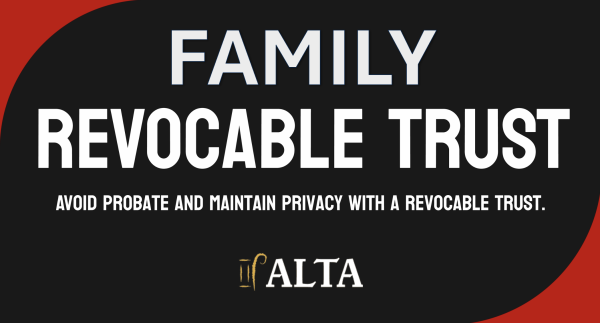United States, 5th Sep 2024 - Mark Fishbein, from ALTA Estate, specializes in creating customized estate plans that consider whether a revocable living trust is appropriate for each client. His goal is to give clients peace of mind by overseeing and distributing their estate according to their wishes, with an emphasis on minimizing taxes, avoiding probate, and preserving their legacy for future generations. Mark Fishbein and the ALTA Estate team bring extensive experience and a personalized touch to every facet of estate planning, whether you're interested in setting up a living trust, handling estate taxes, or ensuring your family's future security.

What Is a Living Trust?
A living trust is a legal structure that allows you to manage your assets during your lifetime and determine how they will be distributed after your death, avoiding the need for probate court. This flexible estate planning tool can adapt to changing circumstances. Unlike a will, a living trust becomes effective while you are still alive, providing immediate benefits.
Revocable vs. Irrevocable Living Trusts
The main distinction between a revocable and irrevocable living trust is whether you can change or revoke the trust. A revocable trust allows you to modify its terms or dissolve it during your lifetime, whereas an irrevocable trust, once created, cannot be changed, offering certain tax advantages and protection of assets.
The Role of a Trustee in a Living Trust
A trustee is responsible for managing the living trust as outlined in the trust agreement. You can act as your own trustee, keeping control of the assets within the trust, or you can appoint someone else, like an individual, bank, or trust company, to manage it on your behalf, particularly if you become incapacitated.
How Does a Living Trust Avoid Probate?
A significant benefit of a living trust is that it bypasses the probate process. Assets in a living trust avoid probate, allowing them to be distributed to beneficiaries more quickly, which is a key consideration when choosing the type of trust to create. Skipping probate saves time and keeps matters private, as probate is public record, making a living trust a valuable part of estate planning.
Advantages of a Living Trust in Estate Planning
A living trust offers various advantages in estate planning, such as avoiding probate, providing clear guidelines for asset distribution, and maintaining control over your estate. It also allows you to manage your assets if you become incapacitated, ensuring that your estate is handled according to your wishes and preventing delays in probate court.
Protecting Minor Children with a Living Trust
If you have minor children, a living trust can be especially useful, allowing you to appoint a successor trustee to manage the assets on your children's behalf until they reach a specified age. This ensures that the assets are used as intended, such as for education or healthcare, in accordance with the trust's terms.
Living Trust vs. Last Will and Testament
While both a living trust and a last will are crucial estate planning tools, they serve different purposes. A will takes effect after death and undergoes probate, whereas a living trust takes effect during your lifetime and can avoid probate. Understanding these differences can help you decide which option better suits your estate planning needs.
Key Steps to Establishing a Living Trust
Setting up a living trust involves creating a trust document, choosing a trustee, and transferring assets into the trust. It's important to seek legal advice to ensure the trust is set up correctly, aligns with your estate planning goals, and to determine if a revocable living trust is the right choice.
When a Living Trust May Not Be Ideal
Although a living trust offers many benefits, it might not be suitable for everyone. The suitability of a living trust depends on factors like the size of your estate, your financial objectives, and the complexity of your estate plan.
Living Trusts and Estate Taxes: Essential Information
It's crucial to understand how a living trust impacts estate taxes and how different types of trusts affect your tax obligations. While revocable living trusts generally do not provide tax benefits, irrevocable trusts can influence your estate's tax liability. Therefore, understanding the terms of the trust is essential when planning. Consulting a financial advisor or estate planning attorney can help clarify how a living trust fits into your overall tax strategy.
Hiring a Professional Estate Planner
ALTA Estate, led by Mark Fishbein, is dedicated to all aspects of estate planning, from living trusts to tax strategies. Trust in the expertise of Mark Fishbein and the ALTA Estate team to guide you through the estate planning process with clarity, compassion, and exceptional professionalism.
Feel free to call the Tucson Estate Planning Preparers at (520) 462-4058 to learn more about proper and complete Tucson Estate Planners and Asset Protection, including the Emergency Telephone Hotline Program afforded to you and your family members at no charge during times of crisis and the other benefits of estate planning described above. Follow Mark Fishbein Tucson Estate Planner on LinkedIn or Facebook.
The text above is for general informational purposes and should not be considered legal advice. For more information, click Contact Us.
Organization: ALTA Estate Planning Services
Contact Person: Office Manager
Website: https://altaestate.com/
Email: Send Email
Country:United States
Release id:16569
The post Mark Fishbein of ALTA Estate Unveils Why Living Trusts Are Essential for Modern Estate Planning: Avoid Probate, Minimize Taxes, and Secure Your Legacy appeared first on King Newswire. It is provided by a third-party content provider. King Newswire makes no warranties or representations in connection with it.
Disclaimer: The views, recommendations, and opinions expressed in this content belong solely to the third-party experts. This site was not involved in the writing and production of this article.

Copyright © 2024 | All rights reserved